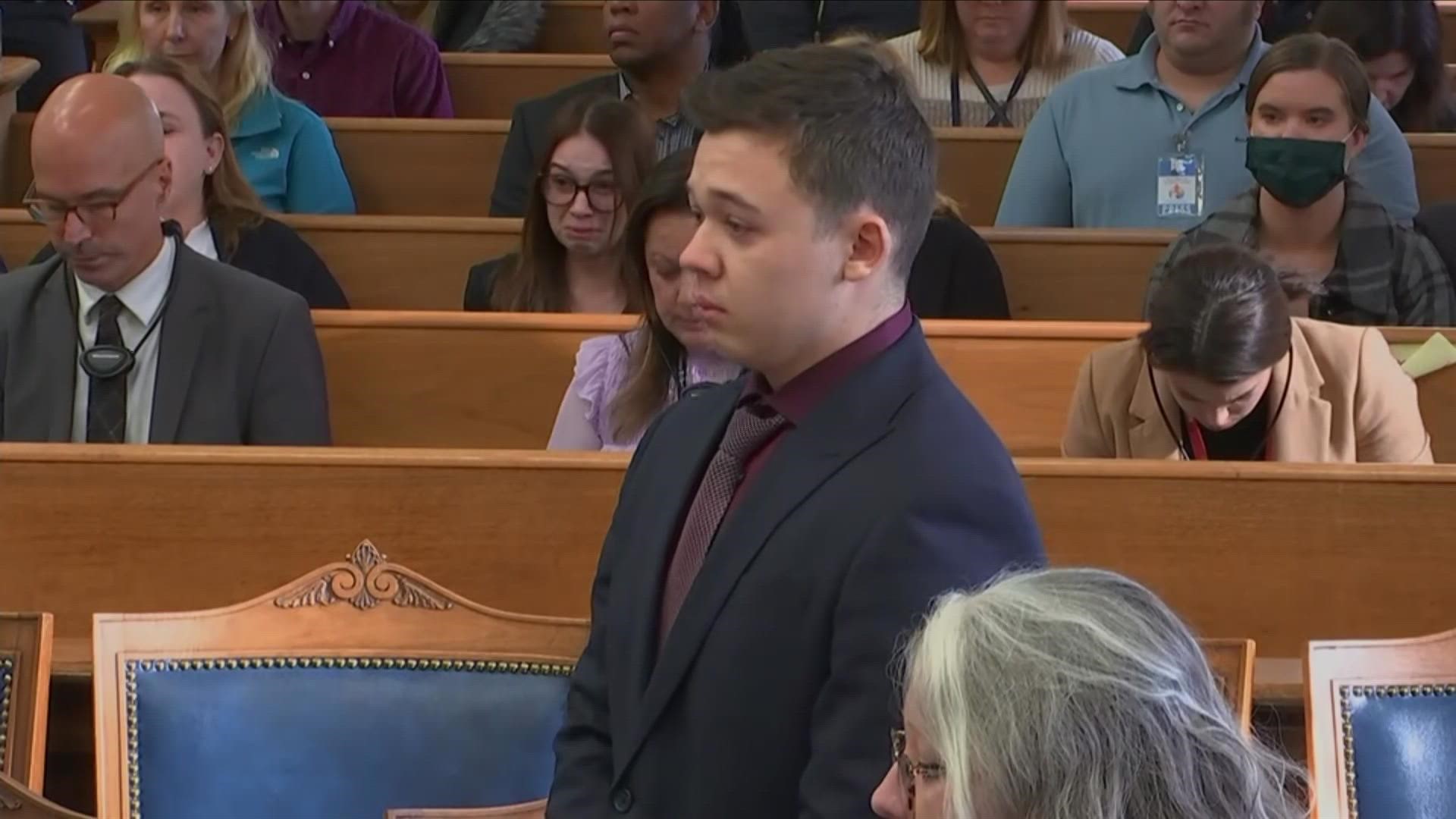KENOSHA, Wis. — Jurors in the Kyle Rittenhouse trial have decided the fate of the 18-year-old who shot three men, killing two of them and wounding the third, during a protest against police brutality in Kenosha, Wisconsin, last year.
Rittenhouse had argued that he fired in self-defense after the men attacked him.
On Friday, the jurors acquitted him of all charges. The 18-year-old began to choke up and fell to the floor. He hugged one of his defense lawyers after hearing the verdict.
He had been charged with homicide, attempted homicide and reckless endangering after killing two men and wounding a third with an AR-style semi-automatic rifle during a tumultuous night of protests over police violence against Black people in the summer of 2020. The former police youth cadet is white, as were those he shot.
The jury, which appeared to be overwhelmingly white, deliberated for close to 3 1/2 days.
Rittenhouse could have gotten life in prison if found guilty on the most serious charge, first-degree intentional homicide, or what some other states call first-degree murder.
As he dismissed the jurors, Circuit Judger Bruce Schroeder assured them the court would take “every measure” to ensure they are safe.
A sheriff’s deputy immediately whisked Rittenhouse out a back door through the judge’s chambers.
What were the charges?
Here's a look at the charges that prosecutors carried into court, as well as lesser charges that the judge put before the jury in final instructions.
COUNT 1: FIRST-DEGREE RECKLESS HOMICIDE, USE OF A DANGEROUS WEAPON
Verdict: Not guilty
This felony charge is connected to the death of Joseph Rosenbaum, the first man Rittenhouse shot. Bystander video shows Rosenbaum chasing Rittenhouse through a parking lot and throwing a plastic bag at him. Rittenhouse flees behind a car and Rosenbaum follows. Video introduced at trial showed Rittenhouse wheeling around and firing as Rosenbaum chased him. Richie McGinniss, a reporter who was trailing Rittenhouse, testified that Rosenbaum lunged for Rittenhouse's gun.
Reckless homicide differs from intentional homicide in that prosecutors aren't alleging Rittenhouse intended to murder Rosenbaum. Instead, they're alleging Rittenhouse caused Rosenbaum's death in circumstances showing an utter disregard for human life.
The charge is punishable by up to 60 years in prison. The dangerous weapon modifier carries an additional five years.
COUNT 2: FIRST-DEGREE RECKLESSLY ENDANGERING SAFETY, USE OF A DANGEROUS WEAPON
Verdict: Not guilty
This felony charge is connected to the Rosenbaum shooting. McGinniss told investigators he was in the line of fire when Rittenhouse shot Rosenbaum. The charge is punishable by 12 1/2 years in prison. The weapons modifier carries an additional five years.
COUNT 3: FIRST-DEGREE RECKLESSLY ENDANGERING SAFETY, USE OF A DANGEROUS WEAPON
Verdict: Not guilty
Video shows an unknown man leaping at Rittenhouse and trying to kick him seconds before Anthony Huber moves his skateboard toward him. Rittenhouse appears to fire two rounds at the man but apparently misses as the man runs away.
This charge is a felony punishable by 12 1/2 years in prison. The weapons modifier again would add up to five more years.
COUNT 4: FIRST-DEGREE INTENTIONAL HOMICIDE, USE OF A DANGEROUS WEAPON
Verdict: Not guilty
This charge is in Huber's death. Video shows Rittenhouse running down the street after shooting Rosenbaum when he falls to the street. Huber leaps at him and swings a skateboard at his head and neck and tries to grab Rittenhouse's gun before Rittenhouse fires. The criminal complaint alleges Rittenhouse aimed the weapon at Huber.
Intentional homicide means just that — a person killed someone and meant to do it. The count carries a mandatory life sentence. The weapons modifier would add up to five years.
The jury also was given the option of second-degree intentional homicide and first-degree reckless homicide in Huber's death.
Second-degree intentional homicide is punishable by up to 60 years in prison.
The first-degree reckless homicide charge sought in Huber's death matches an original charge in Rosenbaum's death — it would require jurors to decide that Rittenhouse caused Huber's death with an utter disregard for human life — and is punishable by up to 60 years in prison.
COUNT 5: ATTEMPTED FIRST-DEGREE INTENTIONAL HOMICIDE, USE OF A DANGEROUS WEAPON
Verdict: Not guilty
This is the charge for Rittenhouse shooting Gaige Grosskreutz in the arm seconds after he shot Huber, and as Grosskreutz came toward him holding a pistol. Grosskreutz survived. Video shows Rittenhouse pointing his gun at Grosskreutz and firing a single round.
The charge carries a maximum sentence of 60 years. The weapons modifier would add up to five more years.
The jury has also been given the option of considering second-degree attempted intentional homicide and first-degree reckless endangerment charges.
The possible punishment for attempted second-degree intentional homicide is 30 years. Attempted first-degree reckless homicide is punishable by up to 12 1/2 years.
COUNT 6: POSSESSION OF A DANGEROUS WEAPON BY A PERSON UNDER 18
The judge dismissed this charge.
Rittenhouse was armed with an AR-style semi-automatic rifle. He was 17 years old on the night of the shootings. Wisconsin law prohibits minors from possessing firearms except for hunting or when supervised by an adult in target practice or instruction in the proper use of a dangerous weapon. Rittenhouse’s attorneys argued that another subsection of the law, regarding short-barreled rifles, provided grounds for dismissing the charge.
Prosecutors argued the defense was misreading the statute, and Schroeder had earlier twice declined to dismiss the charge. But the judge also had said the statute was confusing. After prosecutors conceded that the rifle was not short-barreled, Schroeder dismissed the charge.
COUNT 7: FAILURE TO COMPLY WITH AN EMERGENCY ORDER FROM STATE OR LOCAL GOVERNMENT
The judge dismissed this charge.
Rittenhouse was charged with being out on the streets after an 8 p.m. curfew imposed by the city, a minor offense that carries a fine of up to $200.
Michael Tarm, Scott Bauer and Amy Forliti of the Associated Press contributed to this report.

